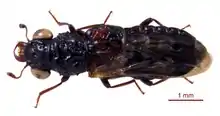Megalopsidiinae
The Megalopsidiinae are a subfamily of the Staphylinidae, rove beetles.[1] They have large eyes, antennae with distinct di- or trisegmented clubs. The tarsal formula is 5-5-5. They have unique elongated processes at theanterior margin of the labrum. They are found in decaying trees and fungus-infested logs. In North America, one genus and two species: Megalopinus caelatus (Gravenhorst) and M. rufipes (LeConte) are known.
| Megalopsidiinae | |
|---|---|
 | |
| Megalopinus caelatus | |
| Scientific classification | |
| Kingdom: | |
| Phylum: | |
| Class: | |
| Order: | |
| Suborder: | |
| Infraorder: | |
| Superfamily: | |
| Family: | |
| Subfamily: | Megalopsidiinae Leng, 1920 |
An extinct species known as Megalopinus extinctus is known from Burmese amber[2]
 Megalopinus caelatus
Megalopinus caelatus M. caelatus
M. caelatus
References
- Newton, A. F., Jr., M. K. Thayer, J. S. Ashe, and D. S. Chandler. 2001. 22. Staphylinidae Latreille, 1802. p. 272–418. In: R. H. Arnett, Jr., and M. C. Thomas (eds.). American beetles, Volume 1. CRC Press; Boca Raton, FL. ix + 443 p.
- "Fossilworks: Megalopinus extinctus". fossilworks.org. Retrieved 7 January 2019.
External links
| Wikispecies has information related to Megalopsidiinae. |
This article is issued from Wikipedia. The text is licensed under Creative Commons - Attribution - Sharealike. Additional terms may apply for the media files.